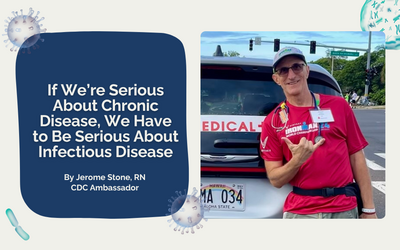
In my 40 years as a registered nurse, I have witnessed the progress we have made in treating and managing chronic disease. I have also seen how quickly that progress can unravel when infectious disease strikes. If we are serious about reducing the impact of chronic disease in this country, we must also stay serious about preventing and fighting infectious disease.
The Impact of Infectious Diseases Among People with Chronic Disease
People with chronic conditions are disproportionately vulnerable. According to the CDC, 3 in 4 U.S. adults live with at least one chronic disease, and they face higher risks of severe outcomes when infected with viruses or bacteria. For example, stroke survivors and people with heart disease are at higher risk of developing serious flu complications. People with diabetes are three times more likely to die from flu-related complications.
The Role of Vaccines and Herd Immunity
Vaccination is one of the most effective and cost-efficient defenses we have.
- Flu vaccination has been associated with a 79% reduction in hospitalization among people with diabetes.
- Pneumococcal vaccines prevent invasive infections among adults with increased risk of pneumococcal disease from chronic conditions such as heart disease, lung disease, diabetes and chronic kidney disease.
These benefits translate into fewer hospital stays, lower healthcare costs, and most importantly, more years of quality life for vulnerable patients. Despite these outcomes, during the 2022-2023 flu season, only 49% of adults with chronic diseases got a flu vaccine.
We also cannot overlook the importance of herd immunity. Vaccines don’t just protect individuals—they reduce disease circulation in the community. This is vital for patients with chronic conditions whose immune systems may not respond as strongly to vaccination. By increasing vaccine coverage at the population level, we create a shield that helps protect those at highest risk.
The Importance of Primary Care
Primary care is the frontline for infectious disease prevention. Trusted relationships with primary care providers increase vaccine confidence, and routine vaccination as part of chronic disease management ensures patients get protection on time. Vaccines should not be treated as an afterthought but as a critical component of comprehensive, lifelong prevention.
Policy Plays a Role
The recent decision by America’s Health Insurance Plans (AHIP) to continue covering all vaccines recommended by the Advisory Committee on Immunization Practices (ACIP) with no cost-sharing is a major win for patients. For people already facing the financial strain of managing chronic disease, removing copays and deductibles is the difference between protection and unnecessary risk.
The connection is clear: fighting infectious disease is part of fighting chronic disease. By investing in primary care, removing barriers to vaccination, and promoting community-wide immunization, we can reduce the burden of chronic illness, improve quality of life, and lower healthcare costs.
After 40 years in nursing, I know prevention is not just smart policy—it is lifesaving practice.